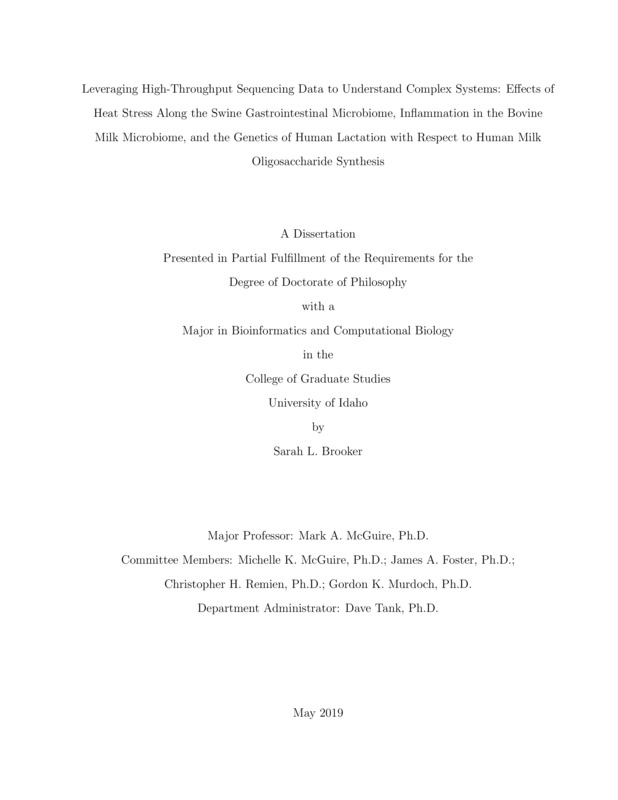Leveraging High-Throughput Sequencing Data to Understand Complex Systems: Effects of Heat Stress Along the Swine Gastrointestinal Microbiome, Inflammation in the Bovine Milk Microbiome, and the Genetics of Human Lactation with Respect to Human Milk Oligosaccharide Synthesis
Brooker, Sarah Liane. (2019-05). Leveraging High-Throughput Sequencing Data to Understand Complex Systems: Effects of Heat Stress Along the Swine Gastrointestinal Microbiome, Inflammation in the Bovine Milk Microbiome, and the Genetics of Human Lactation with Respect to Human Milk Oligosaccharide Synthesis. Theses and Dissertations Collection, University of Idaho Library Digital Collections. https://www.lib.uidaho.edu/digital/etd/items/brooker_idaho_0089e_11527.html
- Title:
- Leveraging High-Throughput Sequencing Data to Understand Complex Systems: Effects of Heat Stress Along the Swine Gastrointestinal Microbiome, Inflammation in the Bovine Milk Microbiome, and the Genetics of Human Lactation with Respect to Human Milk Oligosaccharide Synthesis
- Author:
- Brooker, Sarah Liane
- Date:
- 2019-05
- Keywords:
- Genomics Heat stress Mastitis Microbiome
- Program:
- Bioinformatics & Computational Biology
- Subject Category:
- Bioinformatics
- Abstract:
-
Research has become entwined with sequencing of DNA and RNA to contribute to our understanding of life. The progression of sequencing technology from pattern finding; to targeted, quantitative sequencing; to high-throughput sequencing has provided deep surveys into the breadth of variation in life across all ecosystems. This compilation of chapters seeks to leverage the development of high-throughput sequencing to assess changes in the microbiomes of the gastrointestinal tracts (GIT) of heatstressed pigs, the milk microbiome of cows with varying levels of mammary inflammation, and the host genetic variation of milk carbohydrate-related genes in women around the globe.
In heatstressed pigs, microbial composition clustered distinctly by location in the GIT (stomach, ileum, colon/feces) and differed in select microbes and diversity metrics. The ma- jor finding was that fecal assessment of bacterial composition may not accurately evaluate membership or function the entire gastrointestinal microbiome. Milk microbial composition differed in cows on two dairies and varied with somatic cell counts (SCC; a proxy for inflam- mation). Bacterial richness and diversity of milk with low SCC (<200,000 cells/mL) was greater than in milk with greater SCC (>200,000 cells/mL). Multivariate analysis showed that quarters within a cow were more similar in their microbial composition than among all quarters analyzed. The genetic regulation and composition of milk carbohydrates examined variation on a global scale among women. Some of the genes (FUT2, FUT3, ST6GalNAc5 ), which are critical in the synthesis of human milk oligosaccharides (HMO), were found to be under selective pressure. Additionally, novel single nucleotide polymorphisms (SNP) were identified and known ones confirmed and related to the HMO and lactose in human milk.
These studies provide just a glimpse into the field of milk and lactation, addressing how the GIT may change with external input, how the milk microbiome may fluctuate due to inflammation, and how genetic regulation likely plays a key role in milk composition. The complexities in the field of lactation have only grown with the advancement of sequencing technologies. However, our ability to leverage new information, particularly related to milk, may be the key to further benefitting mother and neonate.
- Description:
- doctoral, Ph.D., Bioinformatics & Computational Biology -- University of Idaho - College of Graduate Studies, 2019-05
- Major Professor:
- McGuire, Mark A.
- Committee:
- McGuire, Michelle K.; Foster, James A.; Remien, Christopher H.; Murdoch, Gordon K.
- Defense Date:
- 2019-05
- Identifier:
- Brooker_idaho_0089E_11527
- Type:
- Text
- Format Original:
- Format:
- application/pdf
- Rights:
- In Copyright - Educational Use Permitted. For more information, please contact University of Idaho Library Special Collections and Archives Department at libspec@uidaho.edu.
- Standardized Rights:
- http://rightsstatements.org/vocab/InC-EDU/1.0/

